6650 Frankford Ave
Philadelphia, PA 19135
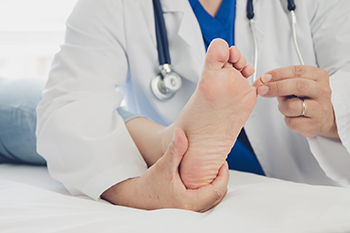
Podiatrists are specialized healthcare professionals who focus on the diagnosis, treatment, and prevention of foot and ankle disorders. There are various compelling reasons to schedule a visit to a podiatrist. First, persistent foot or ankle pain should not be ignored, as it can be an indicator of an underlying issue. Podiatrists are experts in identifying and addressing the source of your discomfort. They can diagnose conditions such as plantar fasciitis, bunions, or heel spurs, and develop personalized treatment plans. If you are experiencing mobility issues, a podiatrist can help. They can provide custom orthotics or recommend appropriate footwear to improve your gait and balance. Diabetes can take a toll on the feet, leading to complications like neuropathy and ulcers. Regular check-ups with a podiatrist are essential for early detection and preventative care. In short, consulting a podiatrist is beneficial for anyone seeking to maintain their overall foot health, in addition to alleviating foot pain. It is suggested that you visit a podiatrist if you are interested in learning more about the field of podiatry.
If you are experiencing pain in the feet or ankles, don’t join the stubborn majority refusing treatment. Feel free to contact John M. Fanelly, DPM from Northeast Philadelphia. Our doctor can provide the care you need to keep you pain-free and on your feet.
What Is a Podiatrist?
Someone would seek the care of a podiatrist if they have suffered a foot injury or have common foot ailments such as heal spurs, bunions, arch problems, deformities, ingrown toenails, corns, foot and ankle problems, etc.
Podiatric Treatment
A podiatrist will treat the problematic areas of the feet, ankle or lower leg by prescribing the following:
A common podiatric procedure a podiatrist will use is a scanner or force plate which will allow the podiatrist to know the designs of orthotics. Patients are then told to follow a series of tasks to complete the treatment. The computer will scan the foot a see which areas show weight distribution and pressure points. The podiatrist will read the analysis and then determine which treatment plans are available.
If you have any questions please feel free to contact our office located in Philadelphia, PA . We offer the newest diagnostic and treatment technologies for all your foot and ankle needs.
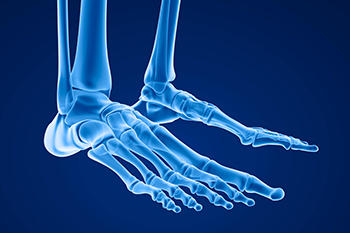
The feet are intricate structures comprising a complex interplay of bones and muscles. The skeletal foundation, consisting of 26 bones per foot, provides the necessary framework for stability and mobility. These bones, meticulously arranged in arches and joints, form a remarkable support system that bears the weight of our entire body. Meanwhile, a network of muscles, tendons, nerves, and ligaments allows the feet to function properly. From the dynamic flexing of toes to the subtle shifts in weight distribution, these muscles work tirelessly to maintain balance and facilitate your every step. The feet serve as a testament to the exquisite design of the human body, showcasing the seamless collaboration between bones and muscles that enables you to traverse the world with grace and agility. If you are experiencing pain or other problems related to your foot structure, it is suggested that you consult a podiatrist.
If you have any concerns about your feet, contact John M. Fanelly, DPM from Northeast Philadelphia. Our doctor can provide the care you need to keep you pain-free and on your feet.
Biomechanics in Podiatry
Podiatric biomechanics is a particular sector of specialty podiatry with licensed practitioners who are trained to diagnose and treat conditions affecting the foot, ankle and lower leg. Biomechanics deals with the forces that act against the body, causing an interference with the biological structures. It focuses on the movement of the ankle, the foot and the forces that interact with them.
A History of Biomechanics
Modern technological improvements are based on past theories and therapeutic processes that provide a better understanding of podiatric concepts for biomechanics. Computers can provide accurate information about the forces and patterns of the feet and lower legs.
Understanding biomechanics of the feet can help improve and eliminate pain, stopping further stress to the foot.
If you have any questions please feel free to contact our office located in Philadelphia, PA . We offer the newest diagnostic and treatment technologies for all your foot and ankle needs.
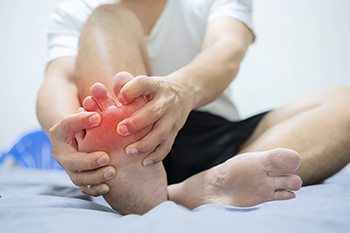
Gout, once associated with excess and opulence, is making a modern resurgence, affecting nearly 4 percent of adults in the US. Gout, a painful inflammatory arthritis, can be found in both men and women, although men are three times more likely to develop it. Caused by the crystallization of uric acid within joints, gout can be both debilitating and chronic. Uric acid, a byproduct of cellular processes, accumulates when the body produces too much or doesn't excrete enough. Gout attacks occur when uric acid levels become excessively high, forming crystals that trigger inflammation and intense pain. The initial gout attack typically targets one joint, often the big toe, with subsequent attacks potentially affecting various joints simultaneously. Joints in the foot, ankle, knee, and even fingers may be affected. During an attack, the affected joint becomes red, swollen, and extremely tender. Even the slightest pressure can induce severe pain. Gout attacks tend to occur suddenly, with nighttime flares being more common. The effect on daily life during a gout attack is significant. While there is no cure for gout, medications and self-management strategies may help to alleviate symptoms and prevent future flares. For help in managing gout, it is suggested that you consult a podiatrist.
Gout is a foot condition that requires certain treatment and care. If you are seeking treatment, contact John M. Fanelly, DPM from Northeast Philadelphia. Our doctor will treat your foot and ankle needs.
What Is Gout?
Gout is a type of arthritis caused by a buildup of uric acid in the bloodstream. It often develops in the foot, especially the big toe area, although it can manifest in other parts of the body as well. Gout can make walking and standing very painful and is especially common in diabetics and the obese.
People typically get gout because of a poor diet. Genetic predisposition is also a factor. The children of parents who have had gout frequently have a chance of developing it themselves.
Gout can easily be identified by redness and inflammation of the big toe and the surrounding areas of the foot. Other symptoms include extreme fatigue, joint pain, and running high fevers. Sometimes corticosteroid drugs can be prescribed to treat gout, but the best way to combat this disease is to get more exercise and eat a better diet.
If you have any questions please feel free to contact our office located in Philadelphia, PA . We offer the newest diagnostic and treatment technologies for all your foot and ankle needs.
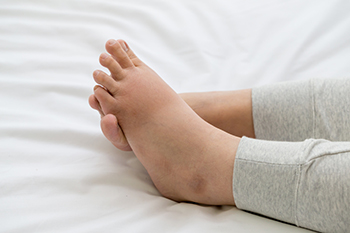
Swollen feet, a prevalent concern affecting individuals across various age groups, often stems from a multitude of factors. Prolonged periods of standing or sitting can impede proper blood circulation, leading to fluid retention and subsequent swelling. Ankle injuries, such as sprains or strains, may result in localized swelling as the body initiates its natural healing response. Additionally, certain medical conditions, like venous insufficiency or deep vein thrombosis, can disrupt blood flow, contributing to swelling in the lower extremities. Pregnancy induces hormonal changes and increased blood volume, causing fluid buildup and swelling in the feet and ankles. Inflammatory conditions such as arthritis may also exacerbate swelling. Lifestyle factors, including a diet high in sodium, can contribute to fluid retention. If you are experiencing swollen feet, it is suggested that you speak with a podiatrist who can determine what the cause is, and offer appropriate treatment measures.
Swollen feet can be a sign of an underlying condition. If you have any concerns, contact John M. Fanelly, DPM of Northeast Philadelphia. Our doctor can provide the care you need to keep you pain-free and on your feet.
Swollen feet are a common ailment among pregnant women and people who stand or sit for extended periods. Aging may increase the possibility of swollen feet and patients who are obese often notice when their feet are swelling too. There may be medical reasons why swollen feet occur:
Swollen feet can also be caused by bone and tendon conditions, including fractures, arthritis, and tendinitis. Additionally, there may be skin and toenail conditions and an infection may cause the feet to swell. Patients who take medicine to treat high blood pressure may be prone to getting swollen feet.
Many patients elevate their feet to help relieve the swelling and this is generally a temporary remedy. When a podiatrist is consulted the reason behind the swelling can be uncovered and subsequently treated.
If you have any questions please feel free to contact our office located in Philadelphia, PA . We offer the newest diagnostic tools and technology to treat your foot and ankle needs.
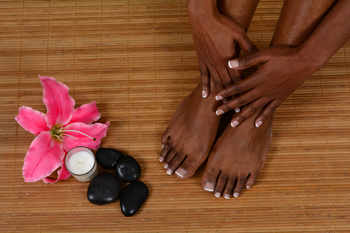
A podiatrist specializes in foot care, providing comprehensive services that can maintain foot health in addition to addressing issues that affect daily comfort and mobility. These medically trained foot doctors offer routine care like trimming nails and managing calluses, which can prevent complications, especially in individuals with diabetes or circulation problems. Podiatrists diagnose and treat conditions such as bunions, heel pain, and plantar fasciitis, often relieving chronic discomfort. They also provide expert advice on proper footwear to support various foot shapes and alleviate pressure points. For athletes, they can help optimize foot function and performance through custom orthotics and injury management. Moreover, a podiatrist plays a vital role in the early detection of serious health problems manifested in the feet, ensuring timely interventions. In an effort to keep your feet healthy, it is suggested that you make routine appointments with a podiatrist who can help you prevent minor issues from becoming severe.
Everyday foot care is very important to prevent infection and other foot ailments. If you need your feet checked, contact John M. Fanelly, DPM from Northeast Philadelphia. Our doctor can provide the care you need to keep you pain-free and on your feet.
Everyday Foot Care
Often, people take care of their bodies, face and hair more so than they do for their feet. But the feet are a very important aspect of our bodies, and one that we should pay more attention to. Without our feet, we would not be able to perform most daily tasks.
It is best to check your feet regularly to make sure there are no new bruises or cuts that you may not have noticed before. For dry feet, moisturizer can easily be a remedy and can be applied as often as necessary to the affected areas. Wearing shoes that fit well can also help you maintain good foot health, as well as making it easier to walk and do daily activities without the stress or pain of ill-fitting shoes, high heels, or even flip flops. Wearing clean socks with closed shoes is important to ensure that sweat and bacteria do not accumulate within the shoe. Clean socks help to prevent Athlete’s foot, fungi problems, bad odors, and can absorb sweat.
If you have any questions please feel free to contact our office located in Philadelphia, PA . We offer the newest diagnostic and treatment technologies for all your foot and ankle needs.